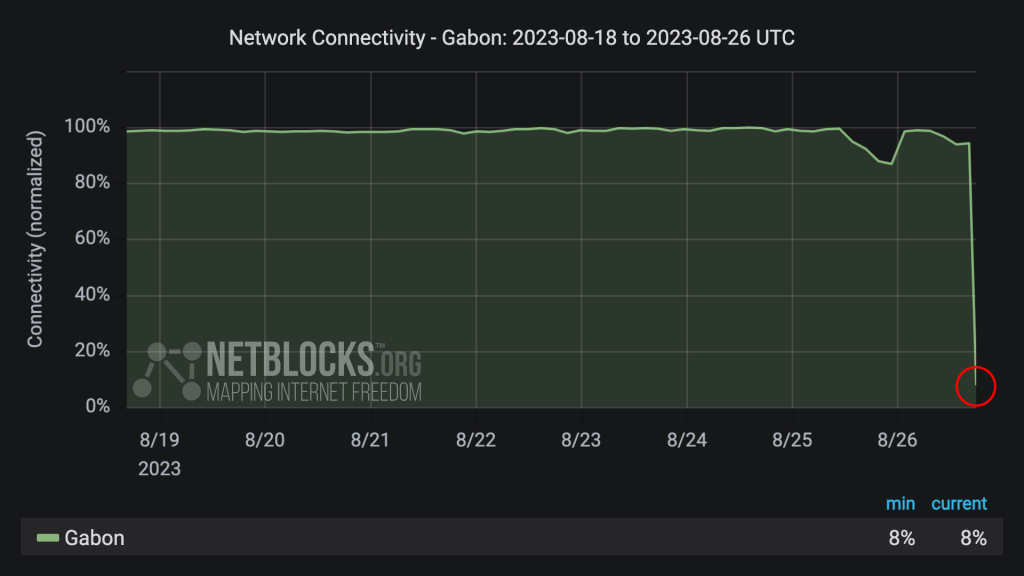Network data from NetBlocks confirm that internet service has been cut on multiple internet providers in Gabon on Saturday 26 August 2023, the day of presidential and legislative elections. A gradual restoration was observed through Wednesday, 30 August, after military officers announced they had taken power to end the incumbent president’s leadership.
The restrictions are likely to limit the free flow of information online, presenting a challenge to election transparency as polls are held and votes counted as President Ali Bongo seeks to continue his family’s 56-year long tenure in power.
⚠️ Confirmed: Live network data show a nation-scale internet blackout is now in effect across #Gabon on election day; authorities claim the measure is intended to "prevent the spread of calls for violence" as a curfew is imposed ?
? Read more: https://t.co/lnH1UacyFv pic.twitter.com/alTsPOAgUM
— NetBlocks (@netblocks) August 26, 2023
What are the authorities saying?
On Saturday evening, after the closing of polling stations for the presidential and legislative elections, the Gabonese government declared a curfew and halted internet services. This action was taken to “prevent the spread of calls for violence” and mitigate the distribution of “false information.” per the Minister of Communication, Rodrigue Mboumba Bissawou, who communicated on the public television channel that “the government has decided to suspend internet access across the entire territory until further notice.” Additionally, he announced a territory-wide curfew starting from Sunday, August 27, which will be active daily from 7 p.m. to 6 a.m.
ℹ️ Update: Metrics show that internet connectivity has been largely restored in #Gabon after military officers seized power; the nationwide blackout had been imposed on election weekend by President Ali Bongo, who is now under house arrest ?
? https://t.co/lnH1UacyFv pic.twitter.com/waFPx5X0cQ
— NetBlocks (@netblocks) August 30, 2023
What is the context of Gabon’s telecoms blackout?
The internet shutdown has been imposed on election day as President Ali Bongo seeks to win a third seven-year term, furthering concerns over the democratic process in Gabon. It is likely the move will stifle transparency as the opposition hopes to challenge Bongo’s long-standing dominance. Internet service was previous cut in Gabon during the 2019 attempted coup.
Gabon joins Zambia, Congo, Uganda, Tanzania, Guinea, Burundi, Togo, Mauritania, Benin, Cameroon, Mali and other countries in the region that have faced internet shutdowns and social media restrictions during elections in recent years, limiting free expression and civic engagement at critical moments.
Further reading:
- Gabon Shuts Off Internet, Imposes Curfew as Bongo Seeks New Term – Bloomberg
- Gabon cuts internet, imposes curfew amid election voting delays – Reuters
Methodology
This report follows the NetBlocks Election Pathfinder Rapid Response methodology which defines a set of core principles, workflows and benchmarks for network measurement and evaluation during elections and referenda.
NetBlocks diffscans, which map the IP address space of a country in real time, show internet connectivity levels and corresponding outages. Purposeful internet outages may have a distinct network pattern used by NetBlocks to determine and attribute the root cause of an outage, a process known as attribution which follows detection and classification stages.
NetBlocks is an internet monitor working at the intersection of digital rights, cyber-security and internet governance. Independent and non-partisan, NetBlocks strives to deliver a fair and inclusive digital future for all.
[ press | contact ] Graphics and visualizations are provided for fair use in unaltered form reflecting the meaning and intent in which they were published, with clear credit and source attribution to NetBlocks. Intellectual property rights are protected including but not limited to key findings, facts and figures, trademarks, copyrights, and original reporting, are held by NetBlocks. Citation and source attribution are required at the point of use.

